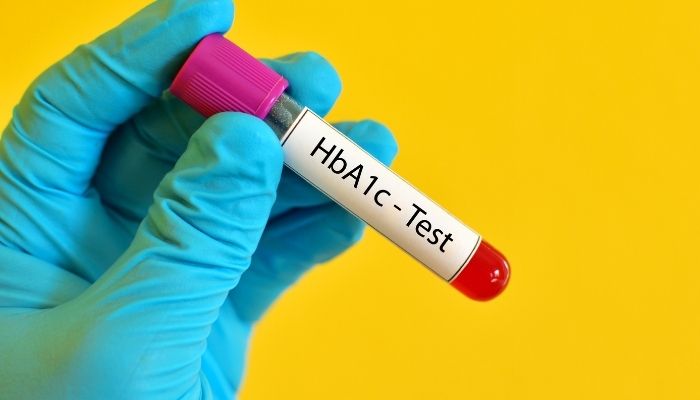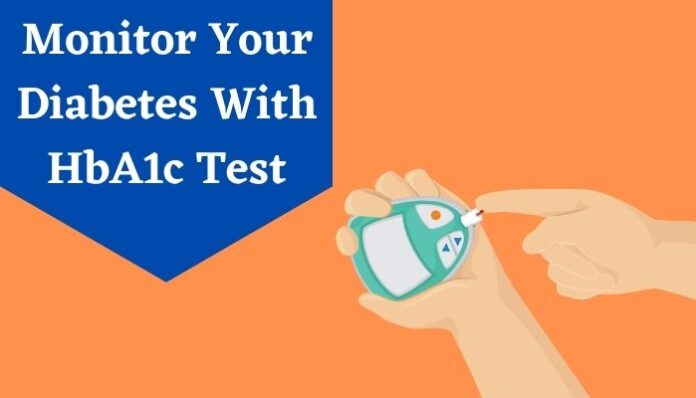The HbA1c test is also called Hemoglobin A1c test, Glycosylated Hemoglobin, or simply A1c. This HbA1c test measures the 90-day average blood glucose levels in your blood. The HbA1c test offers a longer-term trend on blood sugar levels over a certain period. This hemoglobin blood sugar test helps you to know whether you have prediabetes or not. If you have diabetes, then this test monitors your condition and glucose level. If your HbA1c levels are higher than the normal value, then this indicates you have diabetes that is responsible for other health issues like heart disease, kidney disease, nerve problems, etc.
Test Summary
| Is Also Known As | HbA1c, Hemoglobin A1c Test, Glycosylated Hemoglobin, A1c |
| Test Type | Blood |
| HbA1c test includes | Monitors your blood sugar for 3 months or 90 days |
| Preparation | No specific requirements |
| Reporting | Within 24 hrs |
| Test price | The price of this test may vary from city to city and lab to lab |
| Also included in | Health Insurance Plans |
| Related tests | Diabetic Profile, Blood Sugar Fasting, CBC, Lipid Profile |
What is the HbA1c Test?
HbA1c test means glycosylated hemoglobin that measures your average blood sugar for 3 months or 90 days. When sugar invades your bloodstream, it binds with hemoglobin. Hemoglobin is a protein in your red blood cells.
Everyone has some sugar attached to their hemoglobin. But people who have elevated blood sugar levels have more. This HbA1c test detects the percentage of your red blood cells that have sugar-attached hemoglobin.
What is the Normal hba1c Value Level?
Glycosylated Hemoglobin's normal range is below 5.7%. A level of 5.7% to 6.4% indicates prediabetes, and a level of 6.5% or more indicates diabetes. If you belong to the prediabetes category (5.7%-6.4%), then you are more prone to develop type-2 diabetes in the future.Your HbA1c test result can also be reported as estimated average glucose (eAG), the same numbers (mg/dL) you often use to monitor your blood sugar meter.
| A1C % | eAG mg/dL |
| 7 | 154 |
| 8 | 183 |
| 9 | 212 |
| 10 | 240 |
Who Should Go for the Hba1c Test?
- If you are above 45 years and have some health conditions like obesity, heart disease, blood pressure, or have gestational diabetes, then you should go for this test.
- If you have some symptoms of diabetes like frequent urination, increased thirst, blurred vision, fatigue, etc., then you should opt for this test
- If you have prediabetes, then consider a second test after a few days
During The Test Procedure
You don’t need any preparation for this test. You just need to visit your nearest lab or hospital to perform the test. An expert health care professional will draw a blood sample from your vein (preferably from the upper arm) using a small needle. A small volume of blood will be collected into a test tube or vial. You may feel a sharp pain when the needle goes in or out. The entire procedure will be completed within 5 minutes.What Factors Will Affect the Results of Your Hba1c?
Certain factors may increase or decrease your A1C result. These factors can be,- Kidney failure, liver disease, or severe anemia
- A less common type of hemoglobin that citizens of African, Mediterranean, or Southeast Asia have
- People who have certain blood disorders (such as sickle cell anemia or thalassemia)
- Some medicines, including opioids and HIV medications
- Blood loss or blood transfusions
- Early or late pregnancy
The HbA1c test rate is between Rs. 350-Rs.600 depending on your location and place.
Set Your Hba1c Test Result Goal
People who have diabetes should maintain their levels at less than 7%. The higher the hemoglobin A1c, the higher your risk of developing diabetes in future. If you have diabetes and your level is beyond your target, your doctor will alter the treatment plan to minimize your level down.People who have diabetes should go for this test every 3 months to monitor their blood sugar level. But if your diabetes is in good control, you can wait for longer times. The experts recommend checking at least twice every year.


